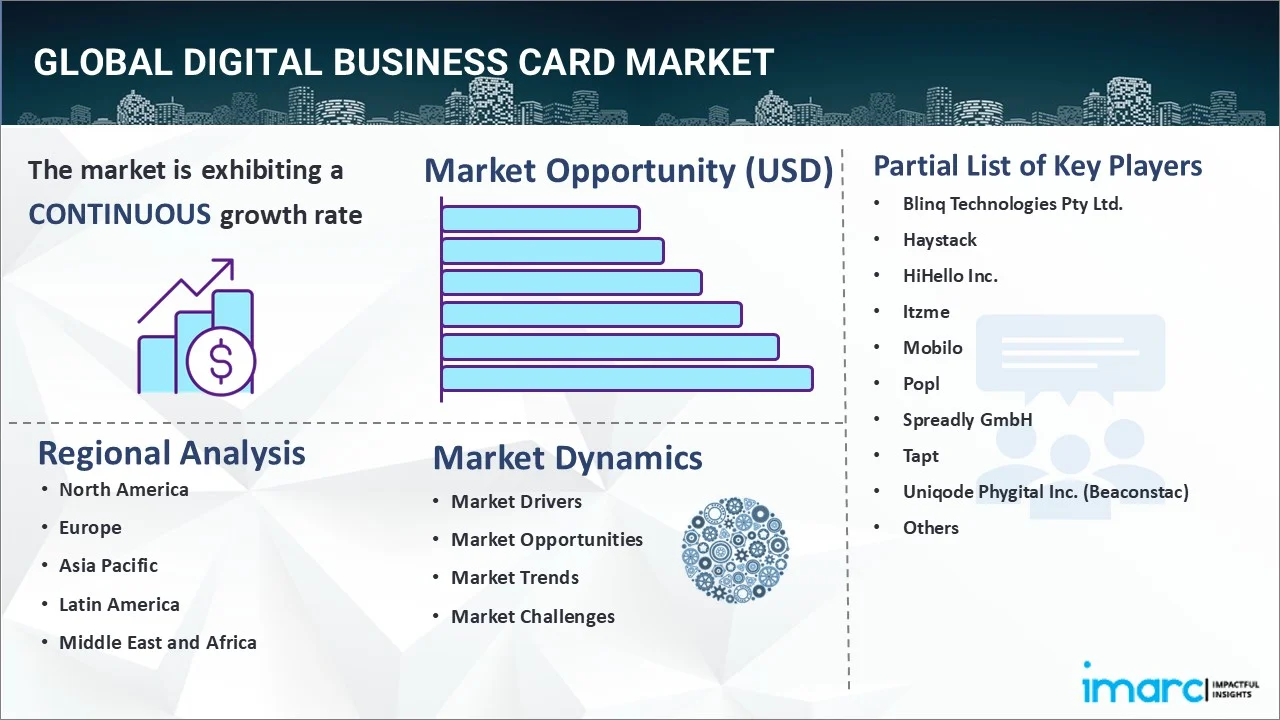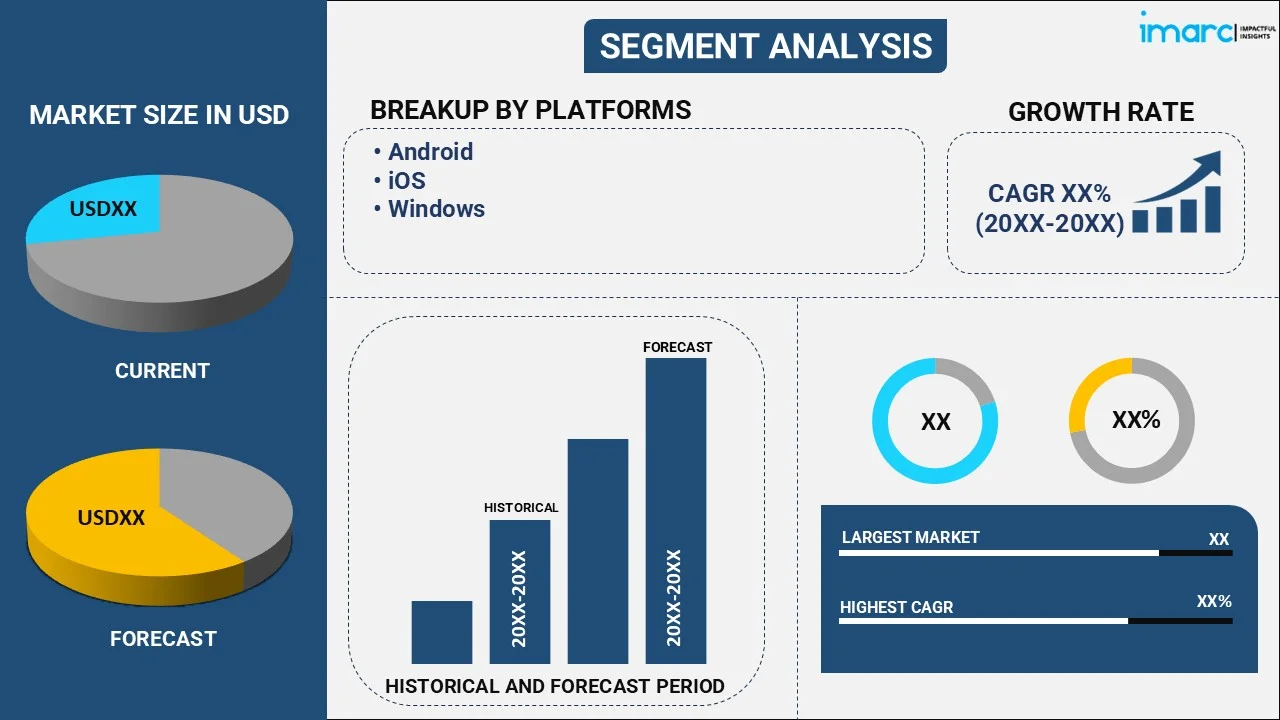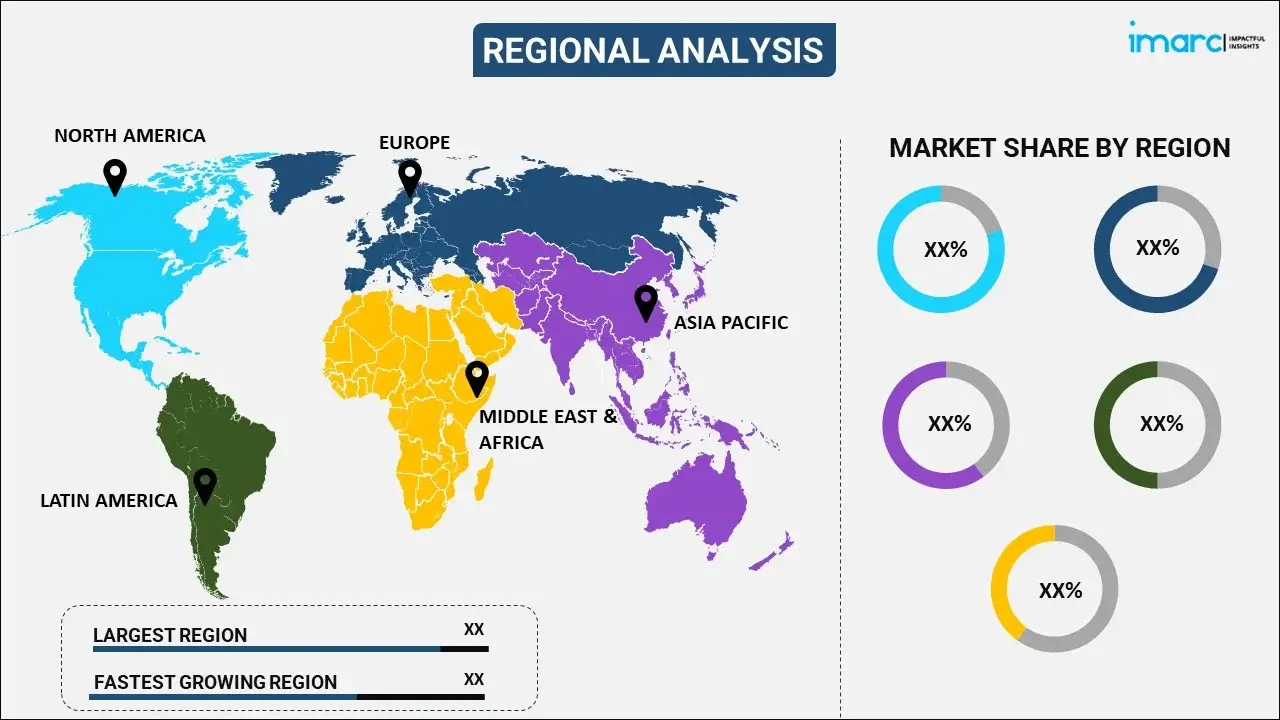
Digital Business Card Market Report by Platform (Android, iOS, Windows), User Type (Business User, Enterprise User, Individual User), Vertical (IT and Telecommunication, Marketing Agencies, BFSI, Sales Entrepreneurs, and Others), and Region 2025-2033
Market Overview:
The global digital business card market size reached USD 178.5 Million in 2024. Looking forward, IMARC Group expects the market to reach USD 381.7 Million by 2033, exhibiting a growth rate (CAGR) of 8.81% during 2025-2033. The increasing preference for the eliminating need for physical exchange and manual data entry, the advent of the product variant as a sustainable and responsible alternative and continual technological advancements are some of the major factors propelling the market.
|
Report Attribute
|
Key Statistics
|
|---|---|
|
Base Year
|
2024 |
|
Forecast Years
|
2025-2033
|
|
Historical Years
|
2019-2024
|
| Market Size in 2024 | USD 178.5 Million |
| Market Forecast in 2033 | USD 381.7 Million |
| Market Growth Rate 2025-2033 | 8.81% |
A digital business card is a modern iteration of the traditional paper business card. It is a virtual representation of your contact and professional information, accessible through digital platforms such as smartphones, email signatures, or social media profiles. Digital business cards often contain essential details such as your name, job title, company name, contact information, including email, phone number, and address, and links to relevant online profiles or websites. They can also include interactive elements like clickable links, QR codes, and multimedia content, such as images or videos, to provide recipients with more engaging and comprehensive information about you and your business.

The global market is majorly driven by the rising consumer preference for efficiency and convenience. Digital business cards are easily shareable via email, messaging apps, and social media. They eliminate the need for physical exchange and manual data entry, streamlining the process of sharing and saving contact information. Moreover, digital card platforms offer analytics that tracks how often the card is viewed and interacted with. This data provides valuable insights into networking effectiveness and engagement, which is creating a positive market outlook. Apart from this, utilizing digital business cards demonstrates a forward-thinking and tech-savvy approach, which can be advantageous in industries that value innovation and modernization, thereby influencing the overall product demand across the globe. Additionally, creating and distributing digital cards often incurs lower costs compared to designing and printing traditional paper cards, especially when considering factors, such as design changes and reprints, thus creating a positive market outlook.
Digital Business Card Market Trends/Drivers:
Proliferation of Mobile Technology
The proliferation of mobile technology has revolutionized the way people interact with information, particularly in the context of networking and professional communication. The ubiquity of smartphones and mobile devices has ushered in an era where instant access to data is not just a luxury, but an expectation. This paradigm shift has significantly influenced the rise and adoption of digital business cards. Smartphones have become an integral part of daily life, acting as personal assistants, communication hubs, and information repositories. With digital business cards, professionals can seamlessly integrate their contact details into this mobile-centric lifestyle, making networking more efficient and effective. It enables instant sharing of digital business cards through various communication platforms, such as email, text messaging, and messaging apps. This eliminates the need for manual data entry and the exchange of physical cards, accelerating the process of connecting with new contacts.
Increasing Environmental Awareness
The growing emphasis on environmental sustainability has prompted a profound shift in the way individuals and businesses approach their daily practices, including how they exchange contact information. Traditional paper business cards have long been associated with wastefulness, considering their production consumes natural resources, generates paper waste, and often ends up discarded after limited use. This backdrop of environmental awareness has catalyzed the rise of digital business cards as a sustainable and responsible alternative. The energy-intensive processes involved in paper production, printing, and transportation are circumvented with digital business cards. This reduction in energy consumption contributes to conservation efforts and reduces reliance on fossil fuels. Also, businesses and individuals who adopt digital business cards demonstrate a commitment to sustainable practices, enhancing their eco-friendly image. This aligns with consumers' increasing preference for environmentally conscious brands and partners.
Rich Multimedia Integration
Rich multimedia integration is a pivotal feature of digital business cards that transforms how professionals present themselves and their work in the modern networking landscape. By seamlessly combining text, images, videos, and interactive links, these digital cards offer a dynamic and immersive representation of one's professional identity, fostering more engaging interactions. Traditional paper cards are limited to basic contact information. In contrast, digital business cards empower individuals to showcase their expertise, achievements, and personality. Links to personal websites, online portfolios, and social media profiles offer a comprehensive view of one's professional journey. For businesses, digital cards with multimedia elements can spotlight products, services, and promotional materials. Videos can provide demonstrations, virtual tours, or insights into the benefits of offerings, enhancing marketing efforts. Also, the ability to integrate branding elements such as logos, color schemes, and visual aesthetics ensures a consistent and memorable brand representation. This strengthens brand recognition and recall.
Digital Business Card Industry Segmentation:
IMARC Group provides an analysis of the key trends in each segment of the global digital business card market report, along with forecasts at the global, regional, and country levels for 2025-2033. Our report has categorized the market based on platform, user type and vertical.
Breakup by Platform:

- Android
- iOS
- Windows
Android platform dominates the market
The report has provided a detailed breakup and analysis of the market based on the platform. This includes android, iOS and windows. According to the report, android represented the largest segment.
Android's open-source nature encourages developers to create and innovate. This has led to the development of numerous digital business card apps catering to various user preferences and needs. Also, its flexible nature allows for deep customization and seamless integration of digital business card apps with other business-related applications. This ensures a smoother user experience and enhances productivity. Since, android runs on a wide range of devices, from budget smartphones to high-end flagship models. This diversity enables users from different segments to access and utilize digital business card apps, making them more inclusive. Android continually updates its operating system and provides support for app developers, ensuring the security and reliability of digital business card apps on the platform. Android devices are available at various price points, making them accessible to a broad audience. This affordability factor further expands the user base for digital business card apps on Android.
Breakup by User Type:
- Business User
- Enterprise User
- Individual User
Enterprise user dominates the market
The report has provided a detailed breakup and analysis of the market based on the user type. This includes business user, enterprise user and individual user. According to the report, enterprise user represented the largest segment.
Enterprise users, often representing businesses and organizations, have extensive professional networking needs. Digital business cards provide a convenient and efficient way to exchange contact information and establish connections, making them particularly valuable to enterprises. Digital business cards allow enterprises to manage contact information more efficiently. Centralized storage and easy access to contact details streamline communication within and outside the organization. Many digital business card solutions offer integration with customer relationship management (CRM) systems. This integration enables enterprises to seamlessly import and manage contacts, fostering better customer relations and lead generation. Enterprise users place a high priority on data security and compliance. digital business card solutions often offer robust security measures and compliance features to protect sensitive business information. Enterprises often operate on a global scale, requiring networking solutions that transcend geographical boundaries. Digital business cards are easily shareable across different regions, making them ideal for international business connections.
Breakup by Vertical:
- IT and Telecommunication
- Marketing Agencies
- BFSI
- Sales Entrepreneurs
- Others
The report has provided a detailed breakup and analysis of the market based on the vertical. This includes IT and telecommunication, marketing agencies, BFSI, sales entrepreneurs and others.
Marketing agencies frequently interact with clients and prospects. Digital business cards offer a professional and efficient way to exchange contact information during meetings, conferences, or networking events. Marketing agencies often prioritize branding and design. Digital business cards allow them to create visually appealing and customizable cards that reflect their clients' brand identities, reinforcing their expertise in marketing and design. Some digital business card platforms support multimedia elements, such as videos, links, or portfolios. This enables marketing agencies to showcase their work, campaigns, and success stories directly through their cards.
On the other hand, professionals in the BFSI sector engage in extensive networking activities, ranging from client meetings to industry conferences. Digital business cards provide a convenient and efficient means of exchanging contact information during these interactions. Many digital business card platforms integrate seamlessly with customer relationship management (CRM) systems, allowing BFSI professionals to import and manage contacts effectively. This integration aids in client relationship management and lead generation.
Breakup by Region:

- North America
- United States
- Canada
- Europe
- Germany
- France
- United Kingdom
- Italy
- Spain
- Others
- Asia Pacific
- China
- Japan
- India
- South Korea
- Australia
- Indonesia
- Others
- Latin America
- Brazil
- Mexico
- Others
- Middle East and Africa
North America exhibits a clear dominance, accounting for the largest digital business card market share
The market research report has also provided a comprehensive analysis of all the major regional markets, which include North America (the United States and Canada), Europe (Germany, France, the United Kingdom, Italy, Spain, and others), Asia Pacific (China, Japan, India, South Korea, Australia, Indonesia, and others), Latin America (Brazil, Mexico, and others), and the Middle East and Africa. According to the report, North America accounted for the largest market share.
North American businesses often have a global reach. Digital business cards can be easily shared with international contacts, making them ideal for professionals and businesses with international operations. It places a strong emphasis on data security and privacy and digital business card solutions often offer robust security features, aligning with these concerns. Digital business card platforms are readily available and easy to use, making them accessible to professionals and businesses throughout North America. Also, the region has a high penetration of smartphones and mobile devices making digital business cards mobile-friendly and aligning with the region's mobile-centric communication habits. Apart from this, digital business card platforms are readily available and easy to use, making them accessible to professionals and businesses throughout North America. It also allows individuals and businesses to showcase their brands, which is particularly important in North America's competitive business landscape.
Competitive Landscape:
Key players prioritize security features to protect user data and ensure compliance with data protection regulations. Robust security measures are essential to gain user trust and maintain a competitive edge. Mobile-friendly digital business card solutions are favored, as they cater to the increasing use of smartphones and mobile devices for professional networking. Mobile accessibility extends the reach of digital business cards. Key players are increasingly focused on offering eco-friendly solutions. digital business cards align with sustainability goals by reducing paper waste, which resonates with environmentally conscious users. Intuitive and user-friendly interfaces are critical to ensure that individuals and businesses can easily adopt digital business cards. Key players invest in user experience design to make their solutions accessible to a wide audience. The rise of remote work and virtual interactions has increased the demand for digital business cards. Key players recognize the need to adapt their solutions to cater to the changing work environment.
The report has provided a comprehensive analysis of the competitive landscape in the market. Detailed profiles of all major companies have also been provided. Some of the key players in the market include:
- Blinq Technologies Pty Ltd.
- Haystack
- HiHello Inc.
- Itzme
- Mobilo
- Popl
- Spreadly GmbH
- Tapt
- Uniqode Phygital Inc. (Beaconstac)
- Virtual Business Card
Digital Business Card Market Report Scope:
| Report Features | Details |
|---|---|
| Base Year of the Analysis | 2024 |
| Historical Period | 2019-2024 |
| Forecast Period | 2025-2033 |
| Units | Million USD |
| Scope of the Report | Exploration of Historical and Forecast Trends, Industry Catalysts and Challenges, Segment-Wise Historical and Predictive Market Assessment:
|
| Platforms Covered | Android, iOS, Windows |
| User Types Covered | Business User, Enterprise User, Individual User |
| Verticals Covered | IT and Telecommunication, Marketing Agencies, BFSI, Sales Entrepreneurs, Others |
| Regions Covered | Asia Pacific, Europe, North America, Latin America, Middle East and Africa |
| Countries Covered | United States, Canada, Germany, France, United Kingdom, Italy, Spain, China, Japan, India, South Korea, Australia, Indonesia, Brazil, Mexico |
| Companies Covered | Blinq Technologies Pty Ltd., Haystack, HiHello, Itzme, Mobilo, Popl, Spreadly GmbH, Tapt, Uniqode Phygital Inc. (Beaconstac), Virtual Business Card, etc. |
| Customization Scope | 10% Free Customization |
| Post-Sale Analyst Support | 10-12 Weeks |
| Delivery Format | PDF and Excel through Email (We can also provide the editable version of the report in PPT/Word format on special request) |
Key Benefits for Stakeholders:
- IMARC’s report offers a comprehensive quantitative analysis of various market segments, historical and current market trends, market forecasts, and dynamics of the digital business card market from 2019-2033.
- The research study provides the latest information on the market drivers, challenges, and opportunities in the global digital business card market.
- The study maps the leading, as well as the fastest-growing, regional markets. It further enables stakeholders to identify the key country-level markets within each region.
- Porter's five forces analysis assist stakeholders in assessing the impact of new entrants, competitive rivalry, supplier power, buyer power, and the threat of substitution. It helps stakeholders to analyze the level of competition within the digital business card industry and its attractiveness.
- Competitive landscape allows stakeholders to understand their competitive environment and provides an insight into the current positions of key players in the market.
Key Questions Answered in This Report
The digital business card market was valued at USD 178.5 Million in 2024.
The digital business card market is projected to exhibit a CAGR of 8.81% during 2025-2033, reaching a value of USD 381.7 Million by 2033.
The market is primarily driven by the increasing preference for eliminating physical exchanges, growing adoption of sustainable alternatives, and continual technological advancements. Additionally, the integration of multimedia elements, rising environmental consciousness, and the widespread proliferation of mobile technology further contribute to the digital business card market growth worldwide.
North America currently dominates the digital business card market, supported by high smartphone penetration, technological advancements, and strong emphasis on branding across professional environments in the region.
Some of the major players in the digital business card market include Blinq Technologies Pty Ltd., Haystack, HiHello Inc., Itzme, Mobilo, Popl, Spreadly GmbH, Tapt, Uniqode Phygital Inc. (Beaconstac), and Virtual Business Card.
Need more help?
- Speak to our experienced analysts for insights on the current market scenarios.
- Include additional segments and countries to customize the report as per your requirement.
- Gain an unparalleled competitive advantage in your domain by understanding how to utilize the report and positively impacting your operations and revenue.
- For further assistance, please connect with our analysts.
 Request Customization
Request Customization
 Speak to an Analyst
Speak to an Analyst
 Request Brochure
Request Brochure
 Inquire Before Buying
Inquire Before Buying




.webp)




.webp)












